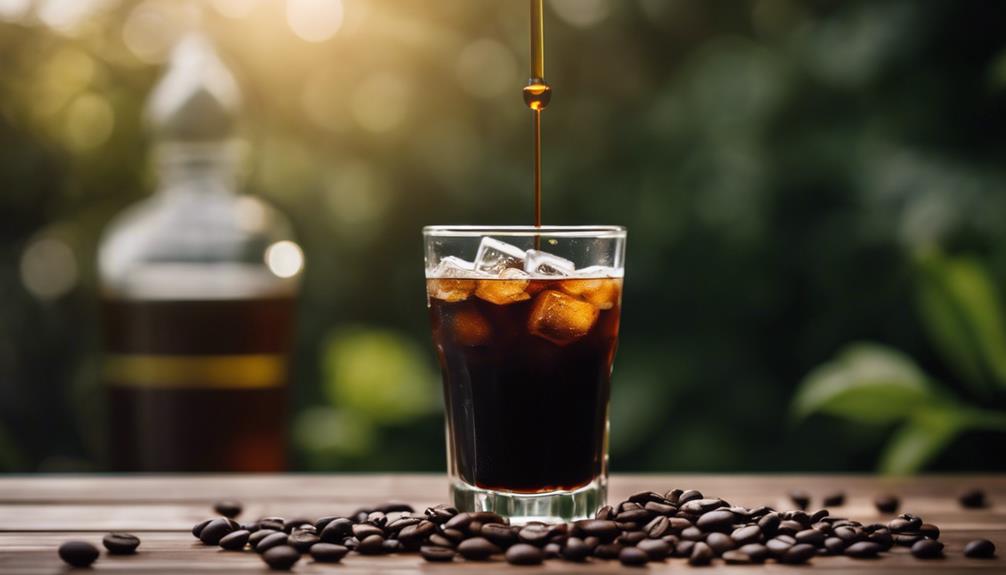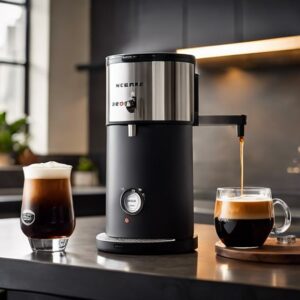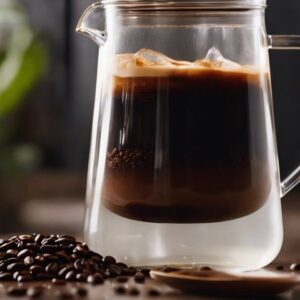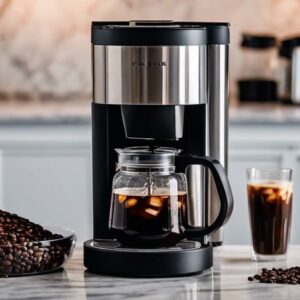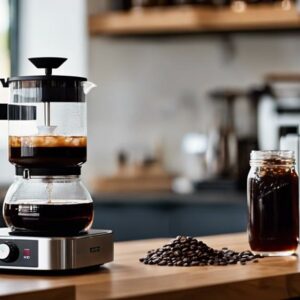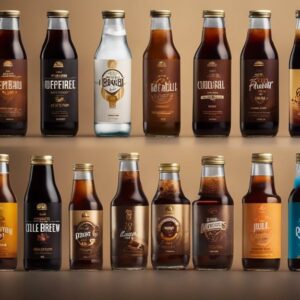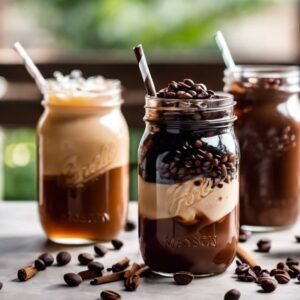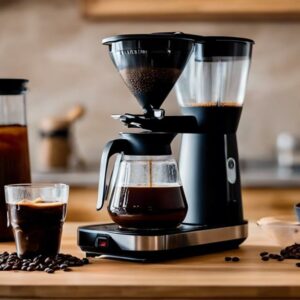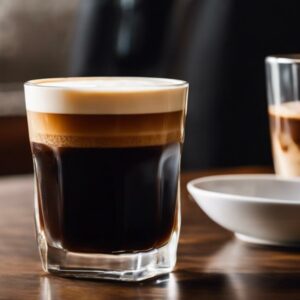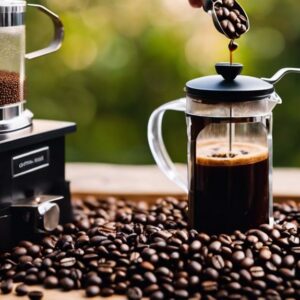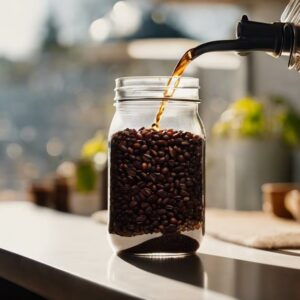You might be surprised to discover that cold brew coffee has some fascinating secrets brewing behind its smooth taste and popularity. From its intriguing history to the unique health benefits it offers, there’s more to this chilled beverage than meets the eye.
Stay tuned to uncover some unexpected facts that will change the way you think about your daily cup of cold brew. As a seasoned coffee enthusiast with over a decade of experience in the specialty coffee industry, I am excited to share my insights and knowledge about this beloved beverage.
Cold Brew Coffee Basics Facts
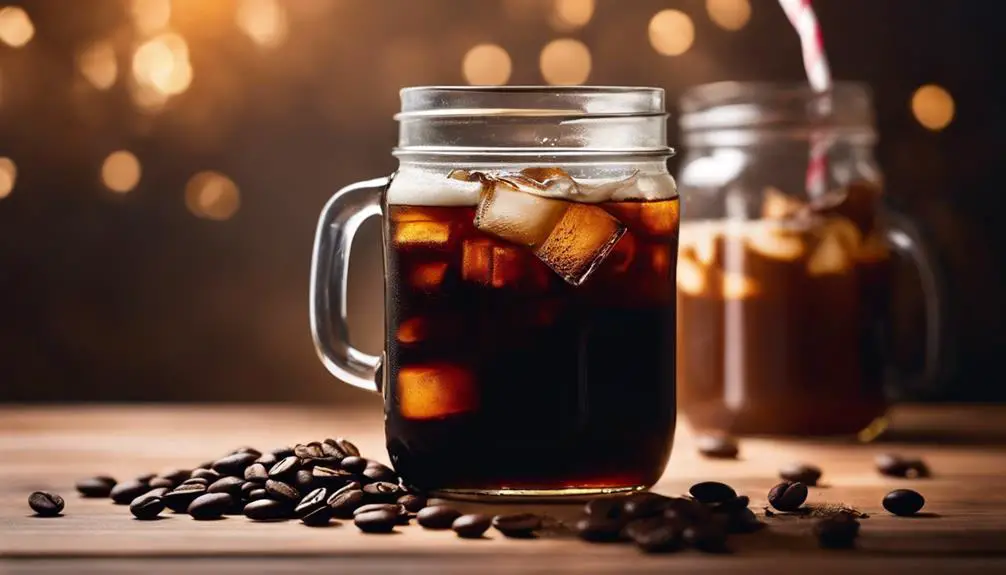
You probably wonder how cold brew differs from iced coffee, why it’s usually stronger, and how its unique brewing process sets it apart.
Have you ever thought about heating up cold brew coffee or wondered why decaf cold brew is a rare find?
The basics of cold brew coffee might surprise you!
How Cold Brew Differs from Iced Coffee
Cold brew coffee distinguishes itself from iced coffee through its unique brewing process that involves steeping coarsely ground coffee beans in cold water for an extended period of time. When comparing the two, cold brew stands out for its:
- Smooth Taste: Cold brew offers a mellow and less acidic flavor profile compared to the potentially diluted taste of iced coffee.
- Brewing Time: Cold brew requires patience, steeping for 12-24 hours, while iced coffee can be made more quickly.
- Health Benefits: Cold brew is known for being less harsh on the stomach due to its lower acidity levels.
- Caffeine Concentration: Cold brew tends to have higher caffeine levels per ounce than its iced counterpart.
- Versatile Uses: Cold brew’s concentrated form makes it ideal for mixing with milk or using as a base for creative coffee cocktails.
Why Cold Brew is Often Stronger Than Regular Coffee
When comparing cold brew to regular coffee, one notable aspect that sets them apart is the higher concentration of caffeine found in cold brew. Cold brew’s unique brewing process allows for a more potent caffeine content, offering a stronger kick in each sip. As a result, cold brew often provides a more intense and invigorating coffee experience.
Here are some key points to consider:
- Caffeine Content: Cold brew boasts a higher caffeine concentration than regular coffee.
- Flavor Profiles: The slow steeping process of cold brew brings out different flavor notes compared to traditional brewing methods.
- Health Benefits: Some believe cold brew may have health benefits due to its lower acidity.
- Popular Brands: Explore a variety of popular cold brew brands to find your favorite.
Discover a world of bold flavors and energizing brews with cold brew coffee.
The Unique Brewing Process of Cold Brew
With its distinct and meticulous brewing method, cold brew coffee sets itself apart from traditional brewing techniques. When you delve into the world of cold brew, you’ll encounter a process that involves patience and precision. Here are some key aspects that make cold brew unique:
- Extended Steeping Time: Cold brew coffee is brewed using cold water over an extended period, often 12-24 hours.
- No Heat Involved: Unlike traditional coffee brewing methods, cold brew is never exposed to heat during the brewing process.
- Concentrated Brew: The resulting cold brew concentrate can be diluted with water or milk to achieve desired strength.
- Smooth and Mellow: Cold brewing brings out unique flavor profiles, often resulting in a smoother, less acidic taste.
- Versatile Brewing Techniques: Cold brew allows for experimentation with different brewing techniques to create diverse flavor profiles.
Can You Heat Up Cold Brew Coffee?
To enjoy your cold brew coffee warm, you may wonder about the possibility of heating it up. Reheating cold brew is entirely feasible and can provide a unique twist to your coffee experience. By gently heating your cold brew on the stove or in the microwave, you can enjoy a comforting warm cup without losing the smooth and less acidic flavors that cold brew is known for.
Additionally, consider using heated cold brew as a base for innovative cold brew cocktails. Mixing warm cold brew with spirits, syrups, or spices can create delicious beverages that blend the rich coffee taste with exciting new flavors.
Why Decaf Cold Brew is Rare
Decaf cold brew is a rare find in the world of cold brew coffee due to the unique challenges involved in extracting caffeine from the brewing process. Market demand primarily drives this scarcity.
Creating decaf alternatives that maintain the rich flavor profiles of traditional cold brew while removing caffeine presents a complex task. The brewing process for cold brew concentrates flavors, making it harder to remove caffeine without compromising taste.
As consumers increasingly seek healthier and diverse options, the demand for decaf cold brew continues to grow. To meet this demand, innovators in the coffee industry are researching new methods to produce decaf cold brew that satisfies both flavor enthusiasts and those looking for a caffeine-free alternative.
Brewing Your Perfect Cold Brew Facts
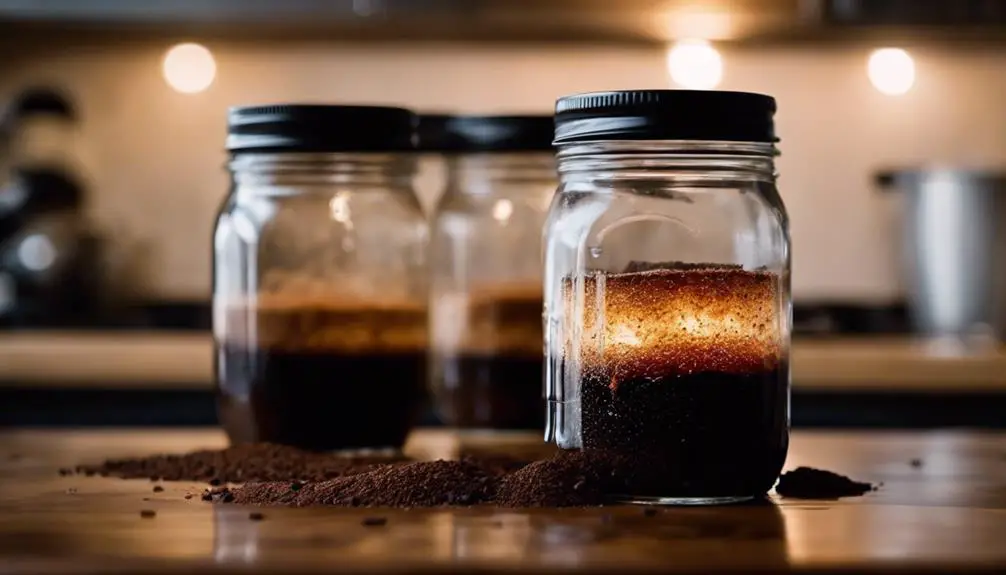
Ready to brew your perfect cold brew?
Wondering if any coffee works, if Arabica or Robusta is better, or what type is best?
Curious about special equipment, or if you can use espresso or old coffee?
Let’s answer these questions to help you make the best cold brew at home!
Can You Use Any Coffee for Cold Brew?
When selecting coffee beans for your cold brew, opt for a coarse grind to ensure optimal flavor extraction. Using the right coffee is crucial for a delicious cold brew. Here are some tips to help you choose the perfect beans:
- Look for single-origin beans to experience unique flavor profiles.
- Experiment with different roast levels for varying taste complexities.
- Consider organic and fair-trade options for a sustainable choice.
- Try blending different coffee varieties for a custom cold brew blend.
- Explore exotic or rare coffee beans for a truly exceptional cold brew experience.
Is Arabica or Robusta Better for Cold Brew?
Considering the unique flavor profiles and brewing characteristics of Arabica and Robusta coffee beans, determining which one is better for cold brew can greatly impact your final brew’s taste. When it comes to bean comparison, Arabica beans are often preferred for cold brew due to their smoother, more complex flavor profile, while Robusta beans are known for their stronger, more bitter taste. If you enjoy a rich and full-bodied cold brew, Arabica might be your best bet. However, if you prefer a more intense and bold flavor, Robusta could be the way to go. Additionally, Arabica beans generally have lower caffeine content compared to Robusta beans, which is an essential factor to consider based on your taste preferences and brewing methods.
| Bean Comparison | Taste Preferences | Brewing Methods | Caffeine Content |
|---|---|---|---|
| Arabica | Smoother, complex | Cold brew | Lower |
| Robusta | Strong, bitter | Cold brew | Higher |
What Coffee is Best for Cold Brew?
For the perfect cold brew, selecting the right coffee is crucial to achieving the desired flavor profile. When choosing coffee for cold brew, consider both the origin of the beans and the flavor profiles they offer. Different coffee origins bring unique characteristics to your cold brew, impacting the taste and overall experience. Here’s a table to help you understand which coffee origins match your flavor preferences:
| Coffee Origins | Flavor Profiles |
|---|---|
| Ethiopian | Fruity, Floral, Citrusy |
| Colombian | Nutty, Chocolatey, Balanced |
| Kenyan | Bright, Wine-like, Blackcurrant notes |
Experimenting with various origins can elevate your cold brew game and introduce you to a world of diverse coffee flavors.
Do You Need Special Equipment for Cold Brew?
To brew the perfect cold brew at home, specialized equipment isn’t necessarily required, but having the right tools can certainly enhance the process and results. Here are some equipment options and brewing hacks to level up your cold brew game:
- Mason jars: Perfect for small batches and easy to store.
- French press: Doubles as a cold brew maker and a hot coffee brewer.
- Cold brew pitcher: Specifically designed for cold brewing, making the process simpler.
- Coffee grinder: Grinding your beans fresh ensures a flavorful cold brew.
- Fine mesh strainer: Essential for filtering out the grounds after brewing.
With these alternatives and tips, you can easily create a delicious cold brew at home without needing specialized equipment.
Can You Use Espresso or Old Coffee for Cold Brew?
You may be wondering about the suitability of using espresso or old coffee for your cold brew. When it comes to cold brew innovation, there are exciting alternatives to traditional brewing methods. Consider these possibilities:
- Espresso Alternatives: Experiment with bold flavors by using espresso shots in your cold brew mix.
- Old Coffee Revival: Revitalize leftover coffee grounds by repurposing them for a unique cold brew experience.
- Creative Blending: Mix different types of old coffee to create a complex and rich cold brew profile.
- Extended Steeping: Try extended steeping times when using old coffee for a stronger flavor infusion.
- Unique Cold Brew: Explore new brewing techniques to make the most of espresso or old coffee in your cold brew creations.
Refrigeration vs. Counter: Best Practices
When brewing your perfect cold brew, consider the best practices of refrigeration versus leaving it on the counter.
Refrigeration offers benefits such as maintaining freshness and preventing bacterial growth, while countertop storage poses risks like quicker spoilage and flavor alteration.
To ensure your cold brew stays at its best, here are some tips to consider:
- Refrigeration Benefits:
- Keeps your cold brew fresh for longer periods.
- Preserves the flavor profile of your coffee.
- Prevents the growth of harmful bacteria.
- Maintains the cold temperature desired for a refreshing drink.
- Ensures each cup tastes as delicious as the first one.
Can Cold Brew Coffee Be Frozen?
Consider extending the freshness of your cold brew by exploring the possibility of freezing it. Freezing cold brew can be a great way to preserve its flavors for longer periods.
Here are some exciting things to consider when freezing your cold brew:
- Taste Impact: Freezing cold brew may slightly alter its taste profile, intensifying certain flavor notes.
- Convenient Ice Cubes: Freeze cold brew in ice cube trays to create coffee cubes perfect for adding a kick to your iced coffee without diluting it.
- Cold Brew Cocktails: Experiment with freezing cold brew to create unique bases for refreshing cold brew cocktails.
- Flavor Infusions: Freeze cold brew with added flavors like vanilla or cinnamon for an extra burst of taste.
- Popular Recipes: Explore online for popular recipes that incorporate frozen cold brew for innovative coffee creations.
Enjoy the icy adventure of freezing your cold brew!
How Light Affects Cold Brew
Exploring how light impacts cold brew can provide valuable insights into enhancing the flavor and quality of your perfect brew. When considering the effects of sunlight and brewing time on your cold brew, keep the following in mind:
- Sunlight Exposure: Direct sunlight can accelerate the brewing process, potentially leading to a stronger and more bitter taste.
- Indirect Light: Indirect light can subtly influence the extraction process, resulting in a smoother flavor profile.
- Brewing Duration: Longer brewing times, especially when exposed to light, can intensify the coffee’s bitterness.
- Lightproof Containers: Using lightproof containers during brewing can help control the light exposure and maintain a consistent flavor.
- Experimentation: Try different brewing times and light conditions to discover your preferred balance of flavors in your cold brew.
Enjoying Cold Brew Coffee Facts
Do you wonder if it’s a sin to drink Cold Brew hot?
Have you ever tried Cold Brew coffee foam and wondered what it is?
Did you know that Cold Brew coffee grounds can be good for plants?
Drinking Cold Brew Hot: Is It a Sin?
When it comes to enjoying cold brew coffee hot, you might be wondering if it’s sacrilegious or simply a new way to savor this popular drink. So, can you really heat up that cold brew and enjoy it without committing a coffee sin? Here are some thoughts to consider:
- Cold brew latte, hot?: Imagine the rich, smooth taste of a cold brew latte but served hot, a cozy twist on a classic.
- Cold brew cocktails, trendy?: Picture mixing warm cold brew with your favorite spirits for a unique and trendy cocktail experience.
- Bold flavors: Heating cold brew may intensify its flavors, unveiling new taste dimensions.
- Comfort in a cup: Sipping hot cold brew can offer comfort and warmth during chilly days.
- Personal preference: Ultimately, whether hot or cold, enjoy your cold brew in a way that suits your taste buds best.
Cold Brew Coffee Foam: What Is It?
Have you ever wondered about the creamy, velvety foam topping on your cold brew coffee?
The foam on cold brew coffee is a result of foam science, created by tiny bubbles forming when the coffee is agitated or whipped.
This foam not only enhances the presentation of your drink but also adds an extra layer of texture and flavor.
Some coffee enthusiasts believe that the foam can affect taste preferences, with a thicker foam potentially altering the overall drinking experience.
Experimenting with different foam consistencies can lead to discovering your perfect cup of cold brew.
Are Cold Brew Coffee Grounds Good for Plants?
Cold brew coffee grounds offer beneficial nutrients that can nourish plants and enhance their growth. When it comes to using them in your garden, consider the following:
- Soil Enrichment: The grounds act as a natural fertilizer, enriching the soil with organic matter.
- Caffeine Boost: Caffeine in the grounds can deter pests like slugs and snails.
- Growth Enhancement: The nutrients in the grounds promote healthier plant growth.
- Eco-Friendly Option: Recycling coffee grounds this way reduces waste and supports sustainable gardening practices.
- Composting: Grounds break down over time, contributing to the compost’s nutrient content.
This innovative approach not only benefits your plants but also aligns with eco-conscious gardening methods.
Can Cold Brew Turn Into Alcohol?
Considering the surprising versatility of cold brew coffee, it may intrigue you to know that under certain conditions, it has the potential to transform into alcohol. Cold brew can develop alcohol content if left to ferment due to its natural sugars.
This transformation can alter the flavor profiles, giving it a tangy or slightly boozy taste. The brewing techniques play a crucial role in this process, where controlling factors like temperature and fermentation time are key.
While cold brew turning into alcohol can be an exciting experiment for some, it’s essential to be cautious as it affects the drink’s shelf stability. So, if you’re up for a unique cold brew experience with a twist, exploring its potential to turn into alcohol might just be the next trend in your coffee journey.
Cold Brew Beyond Coffee

You may be surprised by the creative uses for cold brew – from cocktails to desserts, the possibilities are endless.
If you’re a tea lover, consider experimenting with cold brew techniques to create refreshing and unique tea beverages.
Cold brew isn’t just limited to coffee; it’s a versatile and innovative drink that can be enjoyed in various ways beyond the traditional cup of joe.
Creative Uses for Cold Brew
You may be surprised to learn about the innovative applications of cold brew beyond just your morning cup of joe.
From using cold brew in culinary creations to the unique concept of cold brew yogurt, there are endless possibilities to explore.
Get ready to discover how this trendy beverage can elevate your dishes and desserts in unexpected ways.
Cold Brew in Culinary Creations
Incorporate the rich, smooth flavors of cold brew into your culinary creations for a delightful twist on traditional recipes. Try these innovative ideas:
- Infuse cold brew into your marinades for a unique flavor profile.
- Create refreshing cold brew popsicles for a cool summer treat.
- Experiment with cold brew salad dressings for a bold taste.
- Whip up creamy cold brew ice cream for a decadent dessert.
- Mix up intriguing culinary cocktails with a cold brew kick.
What is Cold Brew Yogurt?
To explore the creative uses of cold brew beyond coffee, consider how cold brew yogurt offers a unique twist on traditional yogurt flavors.
Cold brew yogurt involves infusing yogurt with the rich and smooth taste of cold brew coffee, creating a delightful pairing that elevates the yogurt experience.
This innovative approach allows for exciting flavor experimentation, blending the creamy texture of yogurt with the boldness of cold brew for a refreshing and indulgent treat.
Cold Brew for Tea Lovers
If you enjoy tea, you might be surprised to learn that a Cold Brew Coffee Maker can also be used for making cold brew tea, offering a refreshing twist to your favorite blends.
Wondering if you can use a regular coffee maker for cold brew tea? Stay tuned to find out more about how to achieve that perfect cold brew tea using different brewing methods.
Using a Cold Brew Coffee Maker for Tea
Consider utilizing your cold brew coffee maker to steep tea leaves for a refreshing twist on your favorite beverages.
- Create unique tea infusions with varying brewing techniques.
- Experiment with different tea types like green, black, or herbal teas.
- Discover the smooth and mellow flavors of cold-brewed tea.
- Enjoy a naturally sweetened alternative to traditional iced tea.
- Elevate your tea experience by cold brewing for a delightful change.
Can You Make Cold Brew with a Regular Coffee Maker?
You can indeed create cold brew with a regular coffee maker, opening up a world of possibilities for tea lovers seeking a refreshing alternative.
- Place loose leaf tea or tea bags in the filter basket.
- Add cold water to the reservoir.
- Allow the tea to steep for 12-24 hours in the fridge.
- Once ready, remove the tea bags or strain out the loose leaves.
- Enjoy your homemade cold brew tea!
FAQs About Cold Brew Coffee

Curious about cold brew coffee? Wondering about its storage requirements or its versatility in recipes? Here are some common questions answered for you:
- Why Do People Prefer Cold Brew?
- Can Cold Brew Coffee Be Used in Recipes?
- Does Cold Brew Coffee Need to Be Refrigerated?
- How Long Does Cold Brew Last?
- Is Cold Brew Coffee Stronger Than Regular Coffee?
Why Do People Prefer Cold Brew?
Surprisingly, many coffee enthusiasts prefer cold brew over hot coffee for its smoother and less acidic taste profile. When you choose cold brew, you’re opting for a unique coffee experience. Here’s why people are loving cold brew:
- Richer Flavor Profiles: Cold brew offers a nuanced flavor that’s both bold and refreshing.
- Growing Popularity: Its surge in popularity signifies a shift towards modern coffee trends.
- Health Benefits: Cold brew is known for being less acidic and potentially gentler on the stomach.
- Versatile Serving Styles: From classic on-the-rocks to trendy nitro cold brew, the serving options are endless.
- Innovative Brewing Methods: The innovative techniques used to make cold brew highlight the creativity in the coffee world.
Can Cold Brew Coffee Be Used in Recipes?
Cold brew coffee can add a unique depth of flavor to various recipes, enhancing both sweet and savory dishes. Here are some innovative ways you can incorporate cold brew into your culinary creations:
- Baking with cold brew: Try adding cold brew to chocolate cake batter for a rich and indulgent flavor.
- Cocktails with cold brew: Create a refreshing coffee-infused cocktail by mixing cold brew with vodka, a splash of cream, and a hint of vanilla.
- Marinades: Use cold brew as a base for a tangy and slightly bitter marinade for meats like pork or chicken.
- Salad Dressings: Combine cold brew with balsamic vinegar, olive oil, and honey for a unique twist on a salad dressing.
- Ice Cream: Infuse your homemade ice cream with cold brew for a delicious coffee-flavored treat.
Does Cold Brew Coffee Need to Be Refrigerated?
To ensure the freshness and quality of your cold brew coffee, proper storage is key. When it comes to whether cold brew coffee needs to be refrigerated, here are some essential points to consider:
- Storage options: Refrigerating your cold brew coffee is recommended to maintain its flavor and quality.
- Shelf life: Keeping cold brew refrigerated extends its shelf life, allowing you to enjoy it for a longer period.
- Convenience: Having a chilled bottle of cold brew ready in the fridge makes it convenient for a quick pick-me-up.
- Flavor preservation: Refrigeration helps retain the unique flavors and aromas of your cold brew.
- Quality assurance: Storing your cold brew properly ensures that each sip remains as delicious as the first.
Conclusion
Now that you know the surprising facts about cold brew coffee, you’ll never look at your morning cup the same way again.
Did you know that cold brew coffee has become increasingly popular in recent years, with sales growing by over 370% since 2015?
So next time you sip on this refreshing drink, remember that you’re not alone in enjoying its delicious and smooth taste.
Cheers to cold brew coffee!

